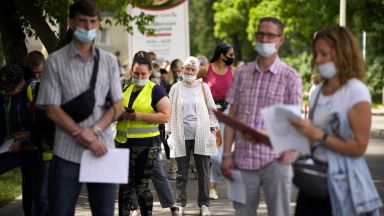European countries are rushing to speed up coronavirus vaccination and anticipate the spread of the more contagious Delta variant. The stakes are high, the goal is not to fill the hospital wards again with patients fighting for their lives, the Associated Press reported, quoted by BTA.
There is an urgent need to react, because for Europe the summer holiday season is starting. Good weather makes people meet more with each other, and the authorities would not want to disturb them. Social distance is widely ignored, especially by young people, and some countries have abolished the requirement to wear a mask outdoors, the AP notes.
People are offered incentives to get vaccinated, including free groceries, travel and entertainment vouchers, and raffles with prizes. The Cypriot president even addressed the patriotic feelings of his compatriots.
In order to prevent a possible sharp increase in the incidence of the infection, the Dutch government has decided to extend the scope of vaccination to children between the ages of 12 and 17.
Greece offers young people a debit card with 150 euros in it when placing the first dose.
In Rome, authorities are considering using vans to vaccinate people on the beach.
Poland organized a lottery last week for fully vaccinated adults, with cars among the prizes.
Portuguese authorities have increased the opening hours of vaccination centers, set up new medical facilities that operate without prior appointment, called on the military for help and reduced the time between the two doses of AstraZeneca vaccine from 12 to eight weeks.
–
“We are in a race against time,” said Portuguese Presidency Minister Mariana Guimaraes Vieira da Silva.
Evgenia Chernyshkova, a waitress, waited in line for vaccination on Thursday in front of the GUM department store on Red Square in Moscow, after the state ordered employees in some industries to be vaccinated.
“Now this is becoming mandatory and we all understand why – because the third wave of the pandemic has already begun here,” she said.
Fifteen months after the WHO announced a pandemic of COVID-19, some governments seem more willing to reward public patience and not rush to return restrictions. During the week, about 40,000 fans went to Wembley Stadium in London for the football match of the European Championship between England and Germany. In Portugal, the new restrictions are half-baked, for example, restaurants are required to work part-time on weekends.

–
In Moscow, however, as of Monday, only visitors who have been vaccinated, have had COVID-19 in the last six months or have a negative test done no later than 72 hours before are allowed in the establishments.
On Wednesday, France also repealed recent more serious measures and allowed unlimited attendance for restaurants, weddings and most cultural events, despite the rapidly growing number of Delta options.
Tiagu Coreira, an associate professor at the Lisbon Institute of Hygiene and Tropical Medicine, notes that people, especially the young, are no longer impatient and want to enjoy the warm summer nights. “People want to return to normalcy faster than vaccination,” he said.
Emerging new variants of the virus have shed light on the unprecedented scale of immunization programs. According to the European Center for Disease Control and Prevention in the countries it studied, 61 percent of people over the age of 18 received the first dose, and 40 percent were fully vaccinated.
But Dr Hans Kluge, head of the WHO’s European office, warned during the week that the Delta option would likely become dominant in the 53 countries in the European region for which his office is responsible by August. He noted that about 63 percent of people in the region are not immunized with the first dose.
“Therefore, the three conditions for a new wave of many hospitalized and deaths before (autumn) are there: new options, insufficient vaccines, large gatherings of people,” Kluge said.
–


